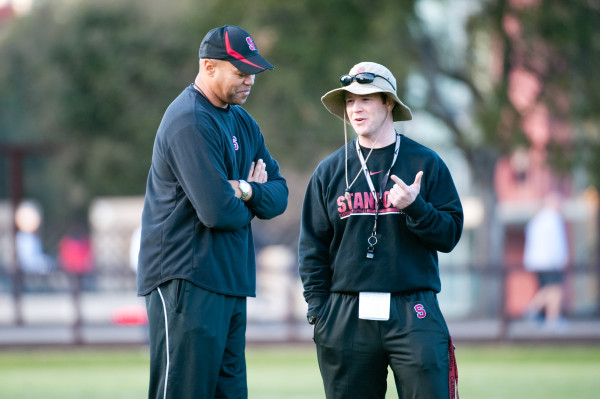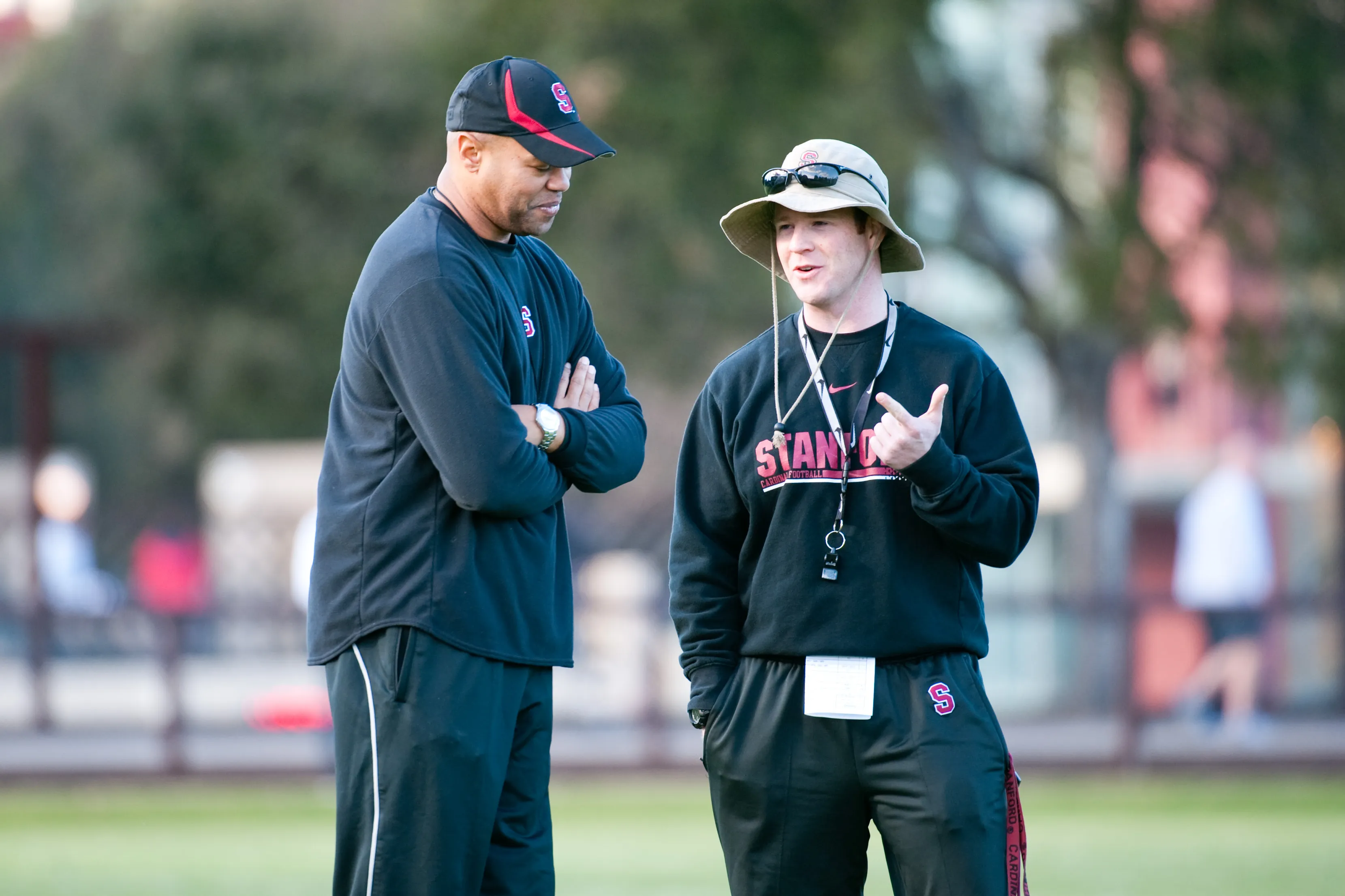This is the final piece of a three-part feature on Shannon Turley, the sports performance coordinator entering his seventh season with Stanford football. Part III focuses on Turley’s personal journey and the future.
At the end of the 2010 season, Stanford football announced its arrival in the only way that a truly relevant program should: by celebrating a coming-out party of historic proportions.
The Cardinal closed its 12-1 campaign in style, opening the new year against Virginia Tech (VT) in the 2011 Orange Bowl and crushing the Hokies 40-12. It finished the season ranked fourth in the country.
Stanford’s triumph was an especially big win for Shannon Turley, a ‘00 graduate of Virginia Tech, who had seen Tech’s rise to prominence firsthand. While Turley had no illusions as to which team he wanted to win, there remained a certain irony to Stanford’s victory: a Hokie supporter since birth and an alumnus and former coach to boot, Turley had naturally sought to help build Stanford in the VT mold.
“A lot of these programs don’t just spring up out of nowhere,” Turley says. “They were able to do that at Virginia Tech, so where else can you do that in college football?”
It turned out that Palo Alto was a great place to do it.
***

Turley enjoyed playing Virginia Tech, if only because it would allow him to see his friends and family, as well as the man who gave him his first college coaching job, VT’s strength coach Mike Gentry.
“No one offered me a scholarship to play football in college; I wasn’t even really looked at as a walk-on at Virginia Tech,” Turley explains. “I found out about their strength program and the job Mike Gentry was doing, and he got a lot of credit and praise for his role in Virginia Tech finishing 10-2 when I was a freshman [in 1995-6—won the Big East title, beat Texas in the Sugar Bowl. And I said, ‘Well, look, that’s what I need to do: I need to be a strength coach.’”
That season, Virginia Tech had won its first conference championship and recorded only the second 10-win season in school history. The Hokies, coming from obscurity to become the newly-anointed football power of the Mid-Atlantic, were the toast of the region.
Looking back, Turley appreciates the similarities between his employer and his alma mater.
“For us, a team built in a blue-collar work ethic, like [Virginia Tech], and wanting to physically dominate our opponents and impose our will—we saw a lot of ourselves in that program,” Turley says.
But the eventual strength coach started not with football but by walking onto the track team. After a (by his own admission) mostly unsuccessful year—“ I did that just to get my foot in the door with the strength and conditioning staff,” he says—Turley asked Gentry for a job.
“Shannon just showed great interest, enthusiasm and seemed very motivated,” Gentry remembers. “I like to see people develop and realize their goals and be part of the process, and I noticed Shannon shares that interest as well.”
It was at Virginia Tech that the underpinnings of Turley’s training philosophy fell into place: weightlifting techniques, to be sure, but also uncompromising standards, high expectations and—as Gentry’s praise indicates—a deep commitment to the process.
The two men still keep in touch to this day, swapping stories, tips and experiences.
“We’ve talked training—he’s shared training philosophies with me.” Gentry said. “And just encouragement. At different times we’ve each encouraged each other.”
“And of course our teams played in the Orange Bowl a couple years ago, and they crushed us. The student kind of taught the teacher.”
***
Gentry’s sentiment speaks to a deeper trend in strength training: the lines between student and teacher are constantly blurred.
In contrast to the public’s typical perception of the ultra-secretive football coach—think of Eric Mangini burning his files or the late Al Davis’ coaching counterespionage—strength and conditioning coaches share information freely. In fact, Turley will be speaking at the annual conference of the National Strength Coaches Association in July.
“I don’t have any secrets, and it’s by and large because I learned it from someone else,” Turley says. “Someone was willing to teach me.”
Indeed, Turley matured under Gentry’s guidance, but he was also heavily influenced by his time under Jeff Fish at Missouri, a coach with a strong reputation for using the unorthodox exercises that Turley now employs.
History tends to blur under these open circumstances: even Gentry, an Olympic lifting stalwart, is not sure who was the first strength coach to apply the Olympic lifts to football.
With Turley, the cycle of coaching has continued. Perhaps the greatest sign of Turley’s achievement as a strength coach is his staff’s coaching turnover: in recent years, he has lost two of his top assistants, Dave Forman and Hans Straub, to head strength coaching positions at Colorado and South Florida. Needless to say, Turley will not be afraid to ask them questions about their own programs.
“Those are guys that I’ll go back to because they were here with me, and say, ‘Hey, what are you doing differently,’ based on the program that I ran and developed,” Turley says. “If they’re having success with it, then obviously I’d be a fool not to listen to what they’d been doing.”
This symbiotic relationship extends to Turley’s players as well as his former mentees. Many veterans of Turley’s program have firmly acknowledged his impact on their lives, and in turn, Turley cites his former players as a great influence on his freshmen. As Stanford football alumni visit and guide the new players, Turley sees a cycle in the making.
“If we’re working to get some change from some of those young freshmen and get them to buy into the way we want them to work, and they’re immature and somewhat reluctant to do it and they see those great players that are now great NFL players here, training and doing it our way, seeking coaching and wanting to do it our way, well, it makes it a little easier for them to buy in,” Turley says. “It makes my job easier. So I’m happy to work with them and thrilled to have them around.”
Alex Debniak concurs. “As the younger kids started coming in,” he says, “they started to see that, and they wanted to have that as well. Now, there’s a combined camaraderie: to be aggressive and to be tough and to give out for each other. I think that’s really the biggest thing that’s changed, without a doubt.”
***
With an NFL factory in the making, a massive facilities expansion underway and three straight BCS bowls under his belt, one could forgive Shannon Turley for easing his foot off the accelerator a bit.
However, coaches are not known for their tendency to relax.
“I don’t think I’m ever ‘satisfied.’ I don’t think anyone’s ever ‘satisfied,’” Turley says.
In particular, Turley sees the need to build Stanford football into not only a consistent winner but an enduring institution in Stanford and Northern California. Stanford’s relatively small local alumni population means that it traditionally relies on non-alumni fans to fill the bulk of its stadium.
“I would love it if people in the area were more passionate about football,” Turley explains. “It hurts to have a great team play so well at home and play a Pac-12 Championship Game in front of less than a full stadium. But you also understand—that’s part of the culture that you’re in, and we embrace that. Having grown up where I did, you know football’s really important, but there’s also a lot less going on.”
About to leave the Farm, Debniak is reflective about that side of Cardinal football as well.
“I think, when you first get to Stanford, you have these dreams of grandeur—everyone’s always thinking, you know, the LSUs or the Alabamas, having women after you…everything like that,” he says. “At least from my personal perspective, when I first got here as a freshman, I was a little disappointed. I was like, this can’t be what it’s all about.”
“But I’ve come to realize that yes, you give a lot of yourself to come in here, but you need to sacrifice your pride and you need to humble yourself, coming here. This place will do that to you. And I think as I’ve matured and gotten older here, I’ve come to realize that this place is bigger than me, it’s bigger than the team.”
***
As Turley watches his players grow closer into a second family, he also recognizes the need for a family of his own. He recently got engaged to his girlfriend, a nurse working at Stanford Hospital’s angiography lab. Displaying a keen flair for the moment, he made sure to propose on New Year’s Day, right after Stanford won the Rose Bowl.
Turley is at a special period of his life, and the setting of his proposal further accentuates the intersection between his life and his career. He is embarking on two great unfolding adventures: Stanford football is fielding its finest teams in seventy years, and soon Turley will be awaiting his bride at the altar.
“We’re getting married in June,” he says and smiles.
With both his personal and coaching lives on the upswing and a bright future ahead, it seems as though Turley has found his place at Stanford.
“I’m not going anywhere. I’m staying here,” he says. “I’ve had opportunities to go other places and I choose to stay here. I love working with the guys that I get a chance to work with every day, and my profession and my role—that’s what I do, I spend time with the players. I love those guys and the opportunity to grind with them every day is not something I am willing to walk away from for more money or what I perceive to be a ‘better job.’
“There’s nothing else I could do and be happy,” he continues. “I tell people when they want to be volunteer interns: if there’s something else that you could do and be happy, then you should go do that, because there’s not enough money, there’s not enough credit, there’s not enough free time. It’s a consuming profession, but it’s very rewarding because of the impact that you can have on the young men and women that you get a chance to work with.”
Saying this, he looks out the window, gazing into the distance.
“My father died when I was four…it was a situation where at a young age I had to fend for myself and I had to figure things out for myself. I paid my way through college; I did it in taking out student loans and working, and I had to grow up a little faster than maybe other people did, and what I learned was I had to take responsibility for my actions, and that if I wanted to achieve things in life I was going to have to do it myself, and I was going to have to be accountable for the choices I made—and if I made positive choices, I would get rewards, and if I made negative choices, I was going to have to deal with the consequences.
“And I can assure you I made mistakes along the way—I’m by no means perfect—but I learned. I learned from those mistakes, and I leaned on my mother and my brothers and sisters and my family—but, really, without growing up with a positive male influence, I gravitated towards my coaches as strong male influences. I found my calling as a coach, and I try to have the same impact on young people now.”
Contact Winston Shi at wshi94 ‘at’ stanford.edu.
Part II: It pays to be different

